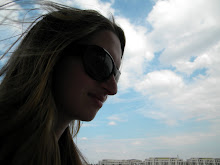Both Augustine's Confessions and the poetry of Rilke grapple with the same issues of eternal extension, God and the limits of the self. In book 5 of Confessions, Augustine addresses the paradox that those who would flee farthest from God attain a place where only He is, and only He will find them.
"For in truth they do not know that you are everywhere; that no place contains you, and that only you are near even to those who seek you, because even if they have abandoned you, their creator, you have not abandoned your creatures...And where was I when I was seeking you? There you were, before me; but I had gone away, even from myself, and I could not find myself, much less you." (Confessions. Trans. Albert C. Outler. New York: Barnes and Noble, 2007. p. 57-58)
The idea of endless spaces and eternal extension, when in confrontation with the limitations of the human soul, is one of the most exhilarating and terrifying concepts ever to strike me. Here, Augustine seems to confront the same issue. God, though infinite, does not fill up or occupy space; however, his presence extends everywhere, and Augustine realizes that wherever his body, or even his soul/mind goes, he will not find a place where God is not.
He speaks of being lost, and unable to find himself. This idea of going outside oneself, denying oneself, being beyond oneself, etc., appears in many contexts in literature, philosophy and the arts. Sometimes, it is used to mean a sort of spiritual distance from the earthbound and physical "self" - transcending life into a spiritual realm. In other instances, it represents a loss of control, a loss of the unity of mind and body, insanity and/or moral depravity. Here, Augustine seems to be referring more to the latter, as contextually he is lamenting his moral condition and the subsequent loss of true unity with himself.
Rilke seems to explore the same ideas in a number of his poems, both with and without direct references to God as the eternal, the infinite or the source of unity.
Take, for instance, the second half of Vorgefuehl (Premonition)
Da weiß ich die Stürme schon und bin erregt wie das
Meer.
Und breite mich aus und falle in mich hinein
und werfe mich ab und bin ganz allein
in dem großen Sturm.
This second stanza is an exploration of solitude and distance from oneself. He 'spreads himself out, and falls back into himself, throws himself away, and is alone in the great storm.' This reference to the storm seems to create a space in which to lose and find himself. That is, the image of the storm forms a kind of limit upon the distance he can go from himself. At the same time, it is as if he is part of the tumultuous motion of the storm. But the fact that he is 'alone in the storm' creates a feeling of intense loneliness or solitude, similar to that of Augustine in his loss of himself and God.
In another poem ("Herbst"), Rilke describes Autumn, first in terms of the falling leaves, then the earth falling out of the stars "into loneliness," then "we all" are falling.
Die Blätter fallen, fallen wie von weit,
als welkten in den Himmeln ferne Gärten;
sie fallen mit verneinender Gebärde.
Und in den Nächten fällt die schwere Erde
aus allen Sternen in die Einsamkeit.
Wir alle fallen. Diese Hand da fällt.
Und sieh dir andre an: es ist in allen.
Und doch ist Einer, welcher dieses Fallen
unendlich sanft in seinen Händen hält.
This gradual expansion from dying leaves into the largest conception possible - that of "falling" as an intrinsic universal quality of all the universe - is once again a stretching of the imagination, seeing how far the mind can go outside itself. Once again, as with Augustine, a limit is reached, and while here Rilke does not specifically cite God, the implication of a deity is there.
The limit is a gentle, and not unwelcome one; there is "One, who holds all of this falling in his hands with endless softness." A stirring balance exists between the allowance of falling and and its being held and supported. What is particularly striking about this poem, however, is the way in which the narrator, though necessarily part of the falling ("we all..."), has achieved a viewpoint seemingly outside of it, in order that he may understand it.
This idea of simultaneous transcendence of the limits of the imagination and participation in the order of the world is a powerful one, aesthetically, emotionally and philosophically. It allows us to go beyond ourselves and our realm of experience without ever losing ourselves, and accomplishes this by providing a limit which is itself infinite. If God is this limit, then it is He who permits us to journey as far as we can conceive without ever interfering; however, He also provides the limit which allows us to conceive of any motion at all, whether physical or spiritual.
Subscribe to:
Post Comments (Atom)

1 comment:
I find your comparison to Augustine's concept of the limits of self-extension interesting, but I find Rilke's poem to much more explicitly Christian in nature. The universal nature of "falling" directly correlates to fallen state of mankind and the presence of sin in all of us. The last stanza would then take on a new meaning, the idea that while God allows sin and evil to exist in this world, he is still holding us "sanft in seinen Händen." He reserves the right to judge, to let us fall or raise us up. In this way he is restored to his place as creator and master of the universe, instead of being set up as a sort of intellectual backstop as your interpretation would suggest.
Post a Comment